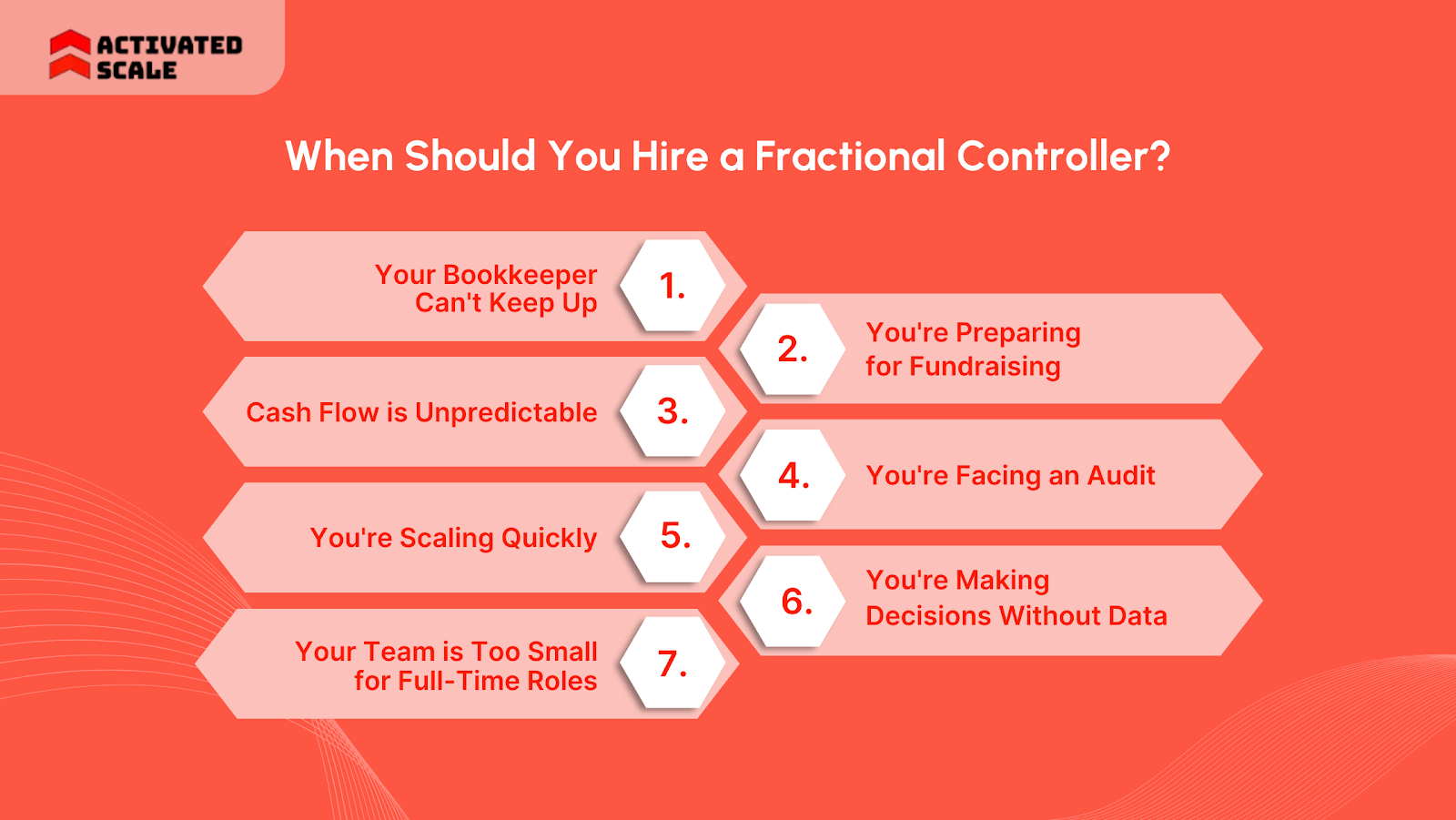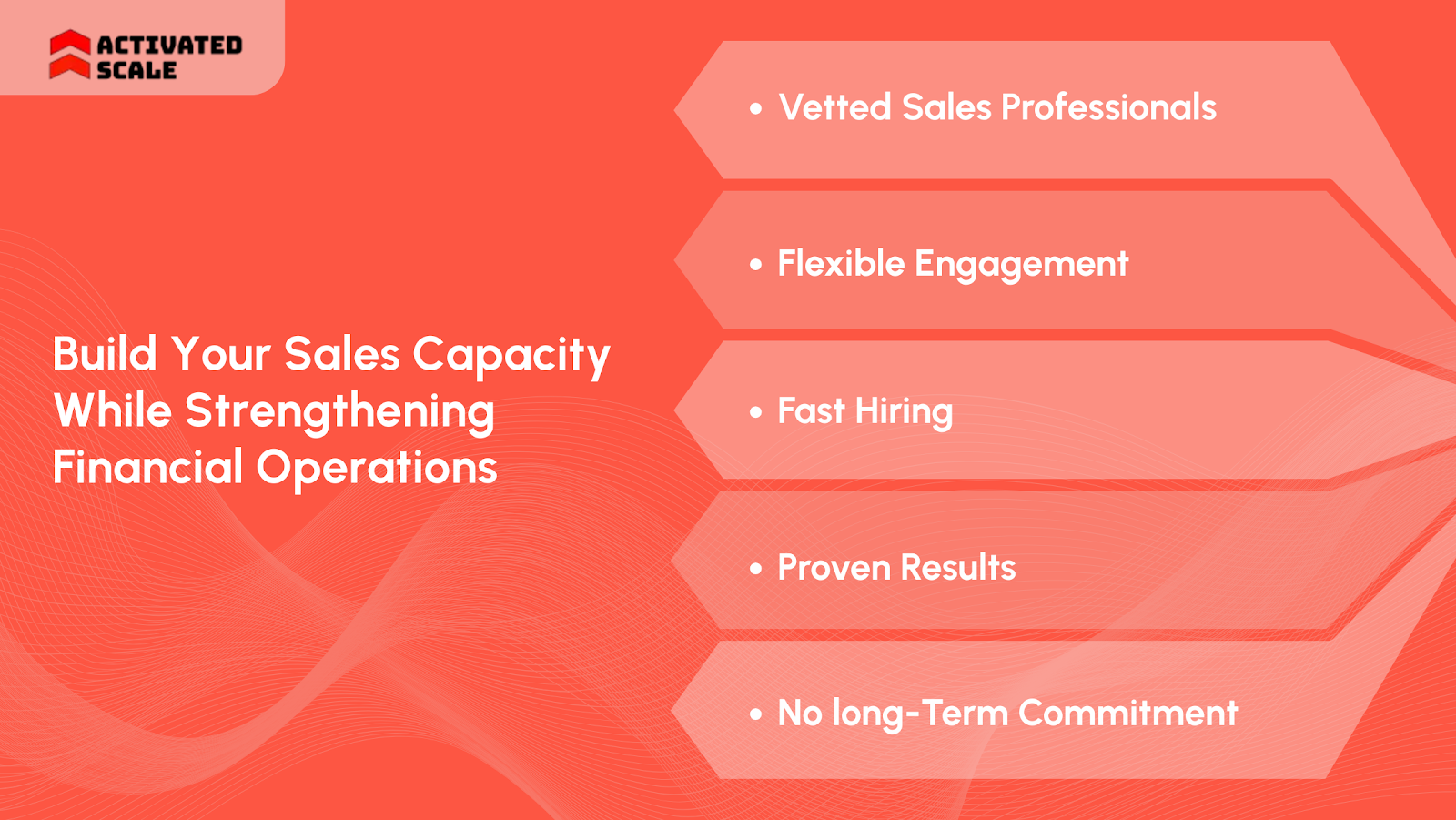Your startup is growing. Revenue is coming in from multiple customers, expenses are piling up across different tools, and you're making decisions based on gut feel instead of solid data. You know you need better financial oversight, but hiring a full-time professional per year isn't realistic for your current stage.
You're not alone in this challenge. 77% of companies highlight that they don’t have the specialized talent and expertise they need to make sense of their data. This is where a fractional controller comes in. You get the expertise of a seasoned financial professional without the commitment or cost of a full-time salary.
In this guide, we break down in detail what a fractional controller does, when you need one, how to choose the right person, and how this role fits into your broader growth strategy.
Key Takeaways
- Fractional controllers cost significantly less than full-time hires, and you can hire vetted fractional controllers in 5-7 days instead of spending 2-4 months recruiting full-time.
- They handle financial reporting, cash flow forecasting, budgeting, and audit prep on a flexible part-time basis.
- Most businesses need a fractional controller when preparing for fundraising, scaling quickly, or outgrowing their bookkeeper's capabilities.
- Fractional controllers differ from CFOs by focusing on day-to-day operations rather than high-level strategy.
- While recruiting, look for industry-specific experience, especially in SaaS revenue recognition or subscription accounting for tech startups.
What Is a Fractional Controller?
A fractional controller is a part-time financial professional who manages accounting operations and provides financial oversight for businesses that need more than basic bookkeeping but can't afford or don't need a full-time controller.
They typically work with multiple clients at once, dedicating a set number of hours per week or month to each business. They're different from bookkeepers, who primarily handle data entry and transaction recording.
For example, a SaaS startup generating $2 million in annual revenue might have a bookkeeper managing invoices and expenses but struggle to produce monthly financial statements or track cash runway. A fractional controller steps in to close the books each month, create profit and loss statements, manage cash flow forecasts, and prepare reports for board meetings.
Most fractional controllers work remotely and use cloud-based accounting software like QuickBooks, Xero, or NetSuite. They integrate into your existing operations without requiring office space, benefits, or payroll taxes.
What Does a Fractional Controller Do?

A fractional controller handles the financial operations that keep your business running smoothly. Here's what they typically manage:
- Financial reporting: They prepare monthly, quarterly, and annual financial statements, including profit and loss statements, balance sheets, and cash flow statements. These reports show you where money is coming from, where it's going, and whether you're on track to hit your goals.
- Cash flow management: They monitor cash inflows and outflows to make sure you have enough liquidity to cover payroll, vendor payments, and other obligations. They also forecast cash needs for the next 30, 60, or 90 days so you can plan ahead.
- Budgeting and forecasting: They work with you to create realistic budgets based on historical data and growth plans. They also track actual performance against the budget and flag variances so you can adjust quickly.
- Accounting operations oversight: They manage your accounting team or bookkeeper, making sure transactions are recorded correctly, accounts are reconciled, and financial data is accurate and up to date.
- Process improvement: They identify inefficiencies in your financial workflows and implement better systems. For instance, they might automate invoice approvals, set up recurring billing processes, or create dashboards that give you real-time visibility into key metrics.
- Audit preparation: They organize financial records, prepare documentation, and coordinate with external auditors to make sure your business is ready for audits without last-minute scrambling.
- Strategic support: They analyze financial data to answer questions like: Which customers are most profitable? Which products have the best margins? Where are we spending too much? They give you insights that help you make better decisions.
For instance, if you run a startup preparing for Series A fundraising, you need clean financial statements, a clear cash runway calculation, and projections that investors can trust. A fractional controller prepares all of this so you can focus on pitching your business instead of fixing spreadsheets.
Why Hire a Fractional Controller?
Hiring a fractional controller gives you financial expertise without the commitment or cost of a full-time hire. Here's why businesses choose this model:
- Lower cost: A full-time controller can be costly, plus you also have to consider benefits, payroll taxes, and overhead. A fractional controller costs much less, especially because you only pay for the time you use.
- Faster access to expertise: Recruiting a full-time controller takes 2–4 months. Hiring a fractional controller can happen in 5–7 days, sometimes faster. You get someone with experience in your industry who can start contributing immediately.
- Flexibility: You can scale their hours up or down based on your needs. During busy periods like fundraising, audits, or year-end close, you increase their time. During slower months, you reduce it.
- Specialized skills: Fractional controllers often have experience across multiple industries and business models. They've handled challenges like yours before and know what works.
- Focus on growth: When someone else is managing your financial operations, you can focus on building product, closing customers, and scaling the business instead of worrying about whether your books are accurate.
- Test before committing: Many businesses hire fractional controllers to test the role before bringing someone on full-time. If the fit is good, you can convert them to an employee once your revenue and complexity justify it.
Just as fractional controllers give you financial expertise when you need it, you also need flexible sales capacity to grow revenue. Activated Scale helps startups hire fractional sales talent on the same model. You can bring on experienced salespeople part-time, test their fit, and convert them to full-time once you're ready.
When Should You Hire a Fractional Controller?

You need a fractional controller when your financial operations are outgrowing your current setup. Here are the most common scenarios:
- Your bookkeeper can't keep up: Bookkeepers handle data entry and basic reconciliation, but they don't manage financial reporting, budgeting, or strategic analysis. If you're constantly asking your bookkeeper for reports they can't produce, you need a controller.
- You're preparing for fundraising: Investors expect accurate financial statements, clean books, and realistic projections. A fractional controller ensures your financials are investor-ready, so you can focus on pitching your vision.
- Cash flow is unpredictable: If you're surprised by cash shortages or unsure whether you can cover next month's expenses, you need someone managing cash flow proactively instead of reactively.
- You're facing an audit: Audits require organized records, supporting documentation, and someone who can work with external auditors. A fractional controller prepares everything so the audit goes smoothly.
- You're scaling quickly: Rapid growth creates complexity. More customers, more products, more expenses. A fractional controller keeps your financial operations organized so growth doesn't create chaos.
- You're making decisions without data: If you're guessing whether a product is profitable, which customers are worth keeping, or where to cut costs, you need financial analysis that a controller provides.
- Your team is too small for full-time roles: Early-stage startups often can't justify full-time finance hires. A fractional controller gives you expertise without forcing you to commit to a large salary before you're ready.
For example, a tech startup preparing for a Series A round needs three months of clean financials, a 12-month cash flow forecast, and a budget for the next year. A fractional controller can step in to prepare all of this while the founders focus on investor meetings.
Fractional Controller vs. Fractional CFO: What's the Difference?
A fractional controller and a fractional CFO serve different roles in your financial operations. A controller focuses on the day-to-day operations that keep your accounting accurate and organized. A CFO focuses on the big picture strategy that shapes your company's financial future. Knowing this difference helps you hire the right role at the right time. Here's how they compare:
A fractional controller makes sure your financial operations run smoothly. A fractional CFO helps you plan for the future, secure funding, and make big strategic decisions. Many businesses need both, starting with a controller to establish strong financial foundations and adding a CFO when they're ready to raise capital or scale aggressively.
For instance, a startup with $3 million in revenue might hire a fractional controller to manage monthly closes and cash flow while bringing in a fractional CFO to prepare for a Series B round.
Can a Controller Become a CFO?
Yes, many controllers grow into CFO roles over time. The path from controller to CFO is common in growing businesses, but it requires developing new skills beyond accounting and operations.
Controllers who want to become CFOs need to build strategic thinking abilities. They need to get comfortable with investor relations, board presentations, and fundraising processes. Controllers work with numbers and reports. CFOs work with people, investors, and vision.
They also need broader business knowledge. A CFO needs to understand sales strategy, product development, market expansion, and how all these pieces connect to financial performance. Controllers focus on what happened and what's happening now. CFOs focus on what should happen next and why.
For example, a fractional controller who has been managing your accounting for two years might transition into a fractional CFO role if they've been involved in strategic discussions, understand your business model deeply, and have developed relationships with your investors and board. This transition works well when the person has shown curiosity about strategy and has been asking questions beyond their accounting responsibilities.
Not every controller wants to become a CFO, and that's fine. Both roles are valuable. The question is whether the person has the interest and ability to grow into strategic work, not just operational excellence.
Why Choose a Fractional CFO or Fractional Controller Over a Full-Time Hire?
Most growing businesses don't need a full-time controller or CFO working 40 hours per week. Your financial operations might only require 15-20 hours of senior-level attention, especially in the early stages. Fractional professionals give you that expertise without paying for unused capacity or taking on the commitment of a full-time employee.
Here's why businesses choose fractional over full-time:
- Lower financial commitment: You only pay for the hours you actually need instead of a full salary plus benefits, payroll taxes, and overhead. This frees up budget for product development, marketing, or sales initiatives that drive growth.
- Faster access to expertise: Recruiting a full-time controller or CFO takes 2-4 months. Fractional professionals can start in 5-7 days through vetted networks, giving you immediate support when you need it most.
- Flexibility as you scale: Business demands change month to month. During fundraising or year-end close, you can increase their hours. During slower periods, you can reduce them without the complexity of managing full-time headcount changes.
- Test before committing long-term: Bringing someone on fractionally lets you evaluate their work quality, culture fit, and value delivery before making a full-time offer. You significantly reduce the risk of a bad hire.
- Right-sized for your stage: Companies under $5 million in revenue rarely have the complexity to keep a full-time controller or CFO busy. Fractional gives you senior expertise matched to your actual workload and needs.
- Specialized experience from day one: Fractional professionals bring experience from multiple companies and industries. They've solved problems like yours before and can contribute immediately.
How to Choose the Right Fractional Controller?
To hire the right fractional controller, you need to find someone with the right experience, skills, and fit for your business. You're not just hiring someone to close your books. You're bringing in someone who will shape how you understand and use your financial data. Here's what to look for when select the fractional controller for your company:
- Industry experience: Look for someone who has worked with businesses like yours. A controller with SaaS experience knows how to handle subscription revenue, deferred revenue, and recurring billing. A controller with e-commerce experience knows inventory accounting and marketplace reconciliations.
- Technical skills: They should be proficient in your accounting software and able to integrate with your existing systems. Ask about their experience with QuickBooks, Xero, NetSuite, or whatever platform you use.
- Communication style: Financial reports are only useful if you can understand them. Look for someone who explains things clearly, answers questions patiently, and tailors reports to what you actually need to know.
- Proactive mindset: The best controllers don't just report what happened. They flag issues early, suggest improvements, and help you plan ahead. Ask for examples of how they've helped other clients improve their financial operations.
- References and track record: Ask for references from other startups or businesses they've worked with. Find out how long those engagements lasted, what results they achieved, and whether clients would hire them again.
- Availability and responsiveness: Make sure they have enough time to dedicate to your business. If they're juggling too many clients, you won't get the attention you need.
- Cultural fit: They'll be working closely with your team, so make sure their working style matches yours. Some controllers prefer structured processes and formal check-ins. Others are more flexible and informal. Choose what works for you.
Build Your Sales Capacity While Strengthening Financial Operations

You've learned how a fractional controller can give you the financial oversight you need without the cost or commitment of a full-time hire. But financial clarity is only part of the growth equation. You also need sales capacity to convert that clarity into revenue.
Activated Scale connects startups and businesses with vetted, experienced sales talent who work part-time or full-time based on your needs. Just as a fractional controller gives you financial expertise when you need it, Activated Scale gives you sales expertise without the risk of a bad full-time hire.
Here's how Activated Scale helps you grow:
- Vetted sales professionals: Work with SDRs, Account Executives, and VPs of Sales who have sold to your buyer at a similar ACV. They bring proven experience and can contribute from day one.
- Flexible engagement: Start with fractional sales talent on a monthly retainer and scale up or down as needed. Convert the best performers to full-time employees when you're ready through our contract-to-hire model.
- Fast hiring: Connect with a vetted salesperson in 5–7 days, sometimes in under 48 hours. No 2–4 month recruiting process, no costly hiring mistakes.
- Proven results: Current customers book 10–15 new meetings per month with fractional SDRs and win $50,000–$250,000 in new revenue per month with fractional AEs.
- No long-term commitment: Pay only for the time you use. No benefits, no payroll taxes, no termination fees. If the fit isn't right, we'll rematch you at no cost.
Just as financial clarity drives better decisions, sales capacity drives revenue growth. Activated Scale helps you hire vetted sales talent who can book meetings, close deals, and grow your business without the risk of a full-time commitment.
Hundreds of businesses are already growing faster with fractional sales talent from Activated Scale. Book a call today to see how we can help you scale revenue.
FAQs
1. What's the difference between a fractional controller and outsourced accounting?
Outsourced accounting firms handle transactional work like bookkeeping, payroll, and tax filing. A fractional controller manages the entire accounting function, provides strategic oversight, and works as part of your team rather than as an external service provider.
2. Do fractional controllers work remotely or on-site?
Most fractional controllers work remotely using cloud-based accounting software. This keeps costs low and gives you access to talent outside your local market. Some may visit your office occasionally for onboarding or special projects, but remote work is the standard.
3. Can I hire a fractional controller if I already have a bookkeeper?
Yes, many businesses have bookkeepers who handle data entry and transaction recording, but need a controller to manage financial reporting, budgeting, and strategic analysis. The controller oversees the bookkeeper and makes sure the financial data is accurate and actionable.
4. Can a fractional controller help with fundraising and investor reporting?
Yes, fractional controllers prepare financial statements, projections, and cash flow forecasts that investors expect. They also help create board reports and materials for due diligence, making fundraising easier and more credible.
5. What industries do fractional controllers typically work with?
Fractional controllers work across many industries, but they're especially common in SaaS, e-commerce, professional services, and tech startups. Look for someone with experience in your industry so they understand your business model and financial details.
6. Should I hire a fractional CFO, a fractional Controller, or both?
It depends on your stage and needs. Hire a fractional controller if you need accurate day-to-day financial operations, reporting, and cash flow management. Hire a fractional CFO if you need strategic guidance for fundraising, major decisions, or long-term planning.
The Ultimate Guide to Hiring a Salesperson!
Get the step-by-step guide to hiring, onboarding, and ensuring success!
_edi.png)



